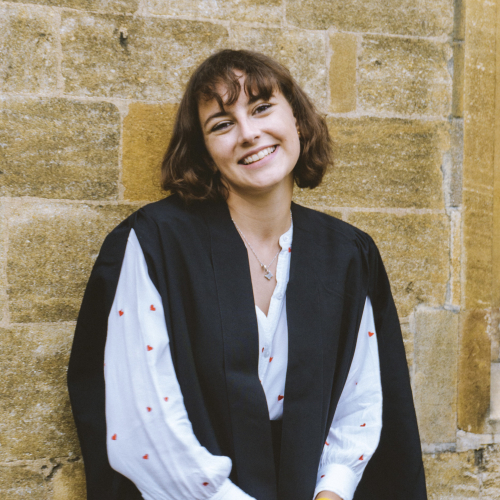
Ms Susie Triffitt
I am an enthusiastic theologian and anthropologist and I ended up in Pembroke because of their Religion and Frontier Challenges Programme. The Programme encourages work which prioritises religious social justice, interdisciplinarity and new technologies. As an interdisciplinary scholar, who works with the precariously housed and homeless, I was really excited by this Programme! I teach students about the Nature of Religions and the Anthropology of Religion. I love both my subjects and I love them together. I will always be fascinated by how people’s faith shapes their lives and my own life. Anthropological method involves spending time with people, getting to know them and learning from them. By bringing this method to theology, I get to learn about faith, God and hope from such different people living diverse and fascinating lives. It is a privilege to live alongside incredible people and hopefully do some good with my research!
I am a theologian and anthropologist focused on the productivity of Christian hope in spaces of apparent despair, with a current focus on those in precarious living situations and the homeless. Before joining the programme, I completed my BA in Theology and Philosophy at the University of Oxford, before undertaking my MPhil in Social Anthropology at the University of Cambridge. Following my Masters, I was awarded the Edward Bailey PhD Studentship at the Divinity Faculty at the University of Cambridge. My PhD thesis was based on 13-months fieldwork in Bradford, West Yorkshire and explored how hope can work backwards-and-forwards in time and resurrect lost agency in community. Alongside my studies, I am the co-founder of the CAT (Cambridge Anthropology-Theology) Network; an online platform fostering dialogue between these disciplines by bringing together over 300 academics from more than 20 countries. I am also a BASR (British Association for the Study of Religion) committee member and part of a new John Templeton project titled "Between Relativism and Reproach", examining how anthropologists and theologians can together navigate the extremes of relativism and judgmentalism to support and understand "the good".
Ms Susie Triffitt

I am an enthusiastic theologian and anthropologist and I ended up in Pembroke because of their Religion and Frontier Challenges Programme. The Programme encourages work which prioritises religious social justice, interdisciplinarity and new technologies. As an interdisciplinary scholar, who works with the precariously housed and homeless, I was really excited by this Programme! I teach students about the Nature of Religions and the Anthropology of Religion. I love both my subjects and I love them together. I will always be fascinated by how people’s faith shapes their lives and my own life. Anthropological method involves spending time with people, getting to know them and learning from them. By bringing this method to theology, I get to learn about faith, God and hope from such different people living diverse and fascinating lives. It is a privilege to live alongside incredible people and hopefully do some good with my research!
I am a theologian and anthropologist focused on the productivity of Christian hope in spaces of apparent despair, with a current focus on those in precarious living situations and the homeless. Before joining the programme, I completed my BA in Theology and Philosophy at the University of Oxford, before undertaking my MPhil in Social Anthropology at the University of Cambridge. Following my Masters, I was awarded the Edward Bailey PhD Studentship at the Divinity Faculty at the University of Cambridge. My PhD thesis was based on 13-months fieldwork in Bradford, West Yorkshire and explored how hope can work backwards-and-forwards in time and resurrect lost agency in community. Alongside my studies, I am the co-founder of the CAT (Cambridge Anthropology-Theology) Network; an online platform fostering dialogue between these disciplines by bringing together over 300 academics from more than 20 countries. I am also a BASR (British Association for the Study of Religion) committee member and part of a new John Templeton project titled "Between Relativism and Reproach", examining how anthropologists and theologians can together navigate the extremes of relativism and judgmentalism to support and understand "the good".